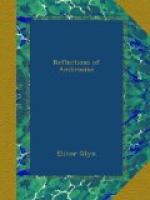I have heard that grandmamma’s marriage with grandpapa—an Englishman—was considered at the time to be a very suitable affair. He had also ancestors since before Edward the Confessor. However, unfortunately, a few years after their marriage (grandmamma was really un peu passee when that took place) grandpapa made a betise—something political or diplomatic, but I have never heard exactly what; anyway, it obliged them to leave hurriedly and go to America. Grandmamma never speaks of her life there or of grandpapa, so I suppose he died, because when I first remember things we were crossing to France in a big ship—just papa, grandmamma, and I. My mother died when I was born. She was an American of one of the first original families in Virginia; that is all I know of her. We have never had a great many friends—even when we lived in Paris—because, you see, as a rule people don’t live so long as grandmamma, and the other maids of honor of the court of Charles X. were all buried years ago. Grandmamma was eighty-eight last July! No one would think it to look at her. She is not deaf or blind or any of those annoying things, and she sits bolt-upright in her chair, and her face is not very wrinkled—more like fine, old, white kid. Her hair is arranged with such a chic; it is white, but she always has it a little powdered as well, and she wears such becoming caps, rather like the pictures of Madame du Deffand. They are always of real lace—I know, for I have to mend them. Some of her dresses are a trifle shabby, but they look splendid when she puts them on, and her eyes are the eyes of a hawk, the proudest eyes I have ever seen. Her third and little fingers are bent with rheumatism, but she still polishes her nails and covers the rest of her hands with mittens. You can’t exactly love grandmamma, but you feel you respect her dreadfully, and it is a great honor when she is pleased.
I was twelve when we left Paris, and I am nineteen now. We have lived on and off in England ever since, part of the time in London—that was dull! All those streets and faces, and no one to speak to, and the mud and the fogs!
During those years we have only twice had glimpses of papa—the shortest visits, with long talks alone with grandmamma and generally leaving by the early train.
He seems to me to be rather American, papa, and very coarse to be the son of grandmamma; but I must say I have always had a sneaking affection for him. He never takes much notice of me—a pat on the head when I was a child, and since an awkward kiss, as if he was afraid of breaking a bit of china. I feel somehow that he does not share all of grandmamma’s views; he seems, in fact, like a person belonging to quite another world than ours. If it was not that he has the same nose and chin as grandmamma, one would say she had bought him somewhere, and that he could not be her own son.
Hephzibah says he is good-natured, so perhaps that is why he made a betise in South America. One ought never to be called good-natured, grandmamma says—as well write one’s self down a noodle at once. While we were in Paris we hardly ever saw papa either; he was always out West in America, or at Rio, or other odd places. All we knew of him was, there was plenty of money to grandmamma’s account in the bank.




